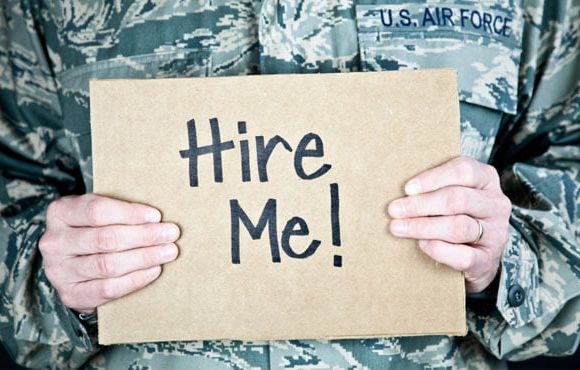Did you know that many military veterans are eligible to receive unemployment benefits when they separate from the military?
Transitioning from a military career to a civilian career is a big step. Not all jobs transfer over from the military and it can be difficult for civilians to understand how much military members bring to the table in terms of experience, leadership and many other attributes. It is not uncommon for military members to struggle when seeking civilian employment.
Thankfully, there are benefits that can help you bridge the gap between military and civilian careers. Service members who are no longer active in the military have the same unemployment benefit options available to them as other Americans. I applied for unemployment benefits when I separated from the military, and I encourage you to do the same if you are eligible.
Unemployment benefits for military veterans
Unemployment compensation may be available to ex-military personnel. If eligible, military members will receive compensation from the Unemployment Compensation for Ex-service members (UCX). This program is run by the federal government, but each state has its own agents representing the UCX. Whether or not you are eligible and how much compensation you will receive depends on several factors. If you receive other compensation (separation pay, retirement pay) the amount of compensation for which you may be eligible will be reduced. Here we look at how you can go about signing up for unemployment compensation and what you can do before separation to get your finances in order.
Signing up for unemployment benefits
Since each state is in charge of unemployment benefits paid out to residents of the state, this is the starting point for signing up for compensation. The state unemployment office will be able to determine if you are eligible to receive benefits, how long you can receive benefits, and how much compensation you will receive. You must apply through the state employment office which will also help you in your search for new employment. When visiting the state employment office to inquire about benefits be sure to have the following documents on hand; job history or resume, Social Security Card, and DD Form 214 (Certificate of Release or Discharge from Active Duty).
A couple of quick notes about military unemployment benefits:
- Federal law requires that you are physically in the state in which you file your first claim based on military wages. You can file in the state in which you separate from the military, but you may need to transfer your unemployment benefits if you move to another state (be sure to check with the employment bureau in the state where you move).
- Unemployment benefits for former military members is usually based on military service wages, however, separation pay or military retirement pay may affect your benefits.
- In most cases, you must have been separated under honorable conditions to be eligible for unemployment benefits.
- Each state may have unique rules or provisions. Check with your state employment office for specific information.
New GI Bill Program for Unemployed Military Veterans
If you are an unemployed veteran, you may be eligible for a new GI Bill program specifically designed for unemployed veterans age 35-60. The good news is this program is open to eligible veterans regardless of whether or not they still have remaining GI Bill eligibility (MGIB benefits typically expire 10 years after a veteran’s separation date).
The VOW to Hire Heroes Act of 2011 offers up to 12 months of education and training at the full-time active duty Montgomery GI Bill rate. Training is available to eligible veterans for VA Approved education and training programs at a community college or technical school. Benefits must be used toward an Associate’s Degree, qualified certification, or a non-college degree in a high demand field (examples include, information technology, trucking, certain medical occupations, and more).
This page covers federal employment resources for veterans.
Prepare your finances before separation from the military
A well-padded emergency fund can provide the financial security necessary during a time of transition from one job to another. Service members who are planning to transition from military to civilian status should plan on saving as much money as they can to help bridge any gaps in employment. It took me about 4 months to find a job when I made the transition from the military to civilian workforce, but your results may vary depending on the economy where you separate, your skills, and other factors. Unemployment benefits helped, but I was also single and had few expenses. If you have a family and more expenses, then you will need a larger nest egg to help you through this transition.
Having enough money to cover several months’ worth of living expenses will offer some peace of mind until you are able to secure your next job. Consider saving your money in a high interest savings account which will offer a decent interest rate while still providing access to your money.




Comments:
About the comments on this site:
These responses are not provided or commissioned by the bank advertiser. Responses have not been reviewed, approved or otherwise endorsed by the bank advertiser. It is not the bank advertiser’s responsibility to ensure all posts and/or questions are answered.
TomNJ says
Is there a place for veterans to receive assistance with unemployment appeals. Separated in MD, received benefits, moved to NJ denied unemployment benefits. MD reversed their decision (verbally) then resumed suspension of benefits. Asking for family member.
Ryan Guina says
Hello Tom,
Each state handles benefits on an individual basis, so you would need to find someone within the state that handles unemployment appeals. I’m not specifically aware of any programs that help veterans appeal unemployment benefits, but since they are handled at the state level, you would most likely need to contact local organizations and agencies.
I would start with the unemployment agency and ask how to appeal, then if that doesn’t work, I would start by contacting the county office of Veterans Affairs, followed by local veterans organizations. Here are some examples of the types of veterans service organizations I would contact.
I wish you the best!
Matt Wirth says
I wanted to add a few things to the topic of filing for unemployment after being released from active duty (relad). First, in my experience you actually have the option of choosing to file from the following states: Home of Record, the state that you were stationed in when you were (relad), or the state in which you live (established residence). So, depending on which state has the highest maximum weekly benefit would dictate which one you file in. So, in my situation I filed in Massachusetts which has one of the highest weekly benefits in the nation. Here is the kicker, in order to apply I had to drive to a Massachusetts’ unemployment office and use their computer to apply because that established that I was physically located on Massachusetts soil and satisfied their physical location requirement upon initial application. After that I could file my weekly benefits from anywhere.
For retirees or those receiving a severance: federal law requires a dollar for dollar reduction of your retirement pension (regular or chapter 61) or severance from your weekly unemployment benefits. However, this rule does not apply to VA compensation. Massachusetts follows federal guidelines word for word with this so I highly recommend taking this rule into account when you are getting out of the military because it can cost you or save you thousands of dollars over the twenty weeks of your first unemployment eligibility. In hind sight I would have said no to receiving my retirement pension and simply waited for a VA decision on disability compensation. Even though Massachusetts allows for retroactive repayment of money they took out of my weekly benefits for my pension they did not repay everything because no one from the VA could provide the necessary letters or documentation to give the Massachusetts review board to overturn the decision to not repay the entire deduction (which cost my family thousands of dollars). Please read and do your homework before you are released from active duty.
Marcelin says
Matt Wirth. Are you positive you can re apply any where after initial application in Massachusetts??
marc fichtner says
Hello, I was wondering if there was an alternative you could use instead of a dd-214 when filing for benefits. I ask this because I am a reservist who was recently deployed and did 7 months active. When i got back i worked for a few weeks then was laid off due to the work being seasonal. I am looking to get benefits until i find another job but don’t want to wait on my dd 214 because i cant get it for at least a month after my leave and orders are completed so by the time i get that then submit claims it will be a while until i receive compensation.. I was just wondering if there was anything else I could use like a copy of my orders or a letter from my commander. thank you
Ryan Guina says
Hello Marc, Thank you for contacting me. I recommend contacting your unemployment office because each state has different rules / requirements for filing unemployment benefits. Also, if you are still on leave, you are technically still employed. You wouldn’t be able to file unemployment benefits until after you have completed your leave and are no longer employed.
I wish you the best, and thank you for your service!
Demorio O’Neal says
Hello, I recently got out on an honorable discharge with 10years in. Yes, I did receive separation pay.
However, I filed for Unemployment. They denied it because you can’t be paid unemployment while receiving payments. That I can reapply , if I don’t have a job once I stop receiving the payments.
For one, it was a lump sum payment, and secondly why does it matter the payment. If I’m currently unable to find employment.
This doesn’t seem right, should I appeal?By the way It’s the state of Georgia.